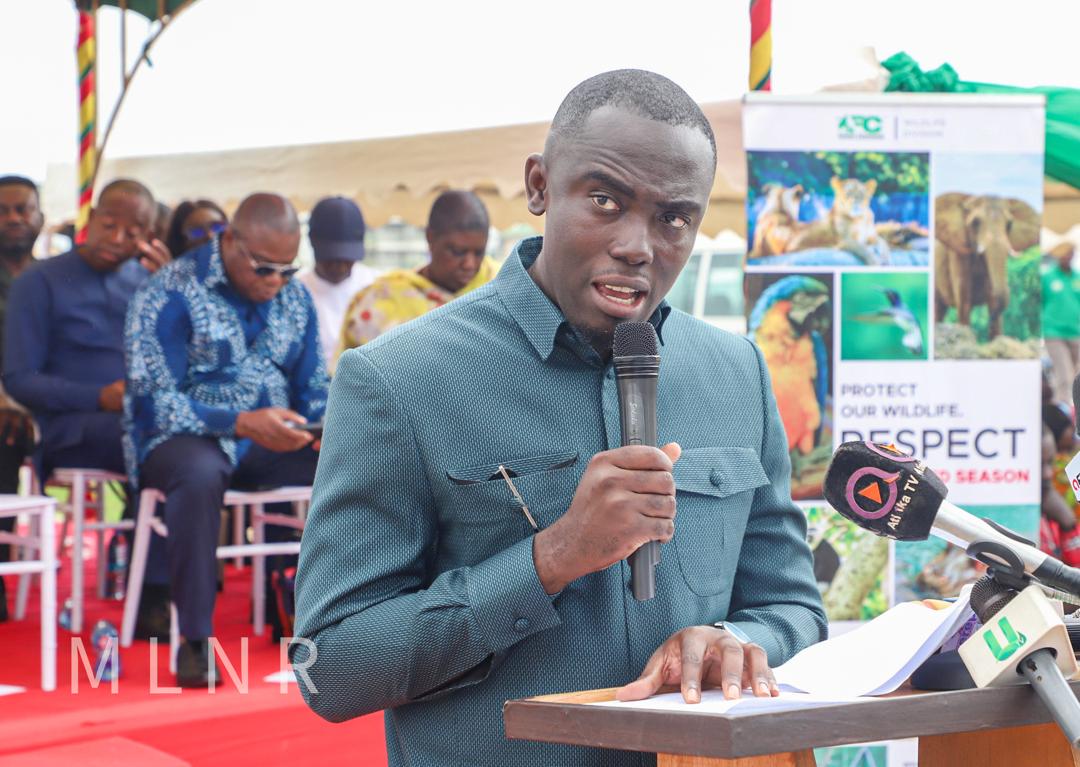The Deputy Minister for Lands and Natural Resources, responsible for Lands and Forestry, Hon. Akwasi Konadu has implored hunters and Bush meat traders to strictly adhere to the ban on the close season for wildlife.
He said, adopting this practice will promote the conservation and sustainable utilization of wildlife and also allow it to breed and procreate.
The Deputy Minister made this statement during the launch of the 2024 Closed Season Observation themed “Wildlife: A Heritage We Must Conserve” on Thursday, 1st August, 2024 in Mankessim, Central Region.
Hon. Konadu indicated that the closed season which begins from 1st August to 1st December annually prohibits hunting, capturing and destroying of wildlife animals. Moreso, the long-awaited Wildlife Resources Management Act, 2023 (Act 1115) which has been assented by the President of the Republic of Ghana HE. Nana Addo Dankwa Akufo-Addo, will regulate the wildlife sector for enhanced socio-economic development.
He noted that one of the purposes of the closed season is to protect wildlife species and secure their habitats for ecotourism development.
“Through the promotion of ecotourism, significant revenues can be mobilized to boost economic development, as it is the case in many African countries, like Kenya, Botswana, Zambia, Namibia, South Africa and Tanzania”.
The Deputy Minister disclosed that, the Ministry together with other state and non-state actors are pursuing a number of interventions to promote sound environmental management.
This, he said, includes strengthening law enforcement through specialized para-military training of the Rapid Response Teams, provision of logistic support to enhance field monitoring operations, expansion of Community Resource Management Areas (CREMAs) to other communities to foster closer community engagement, promotion of various models of reforestation and afforestation, including the flagship Green Ghana Project.
Hon. Akwasi Konadu urged all players in the sector to abide by the Closed Season ban and support the Forestry Commission to achieve its vision of leaving future generations with richer and better forest and wildlife endowment than inherited.
Osagyefo Amanfo Edu VI,Omanhene, Mankessim Traditional Area, Chairman at the event described the adverse effect of disobeying the closed season rule as one which will cause generational loss. He said, it will take a holistic approach to enjoy the benefits of biodiversity.
While cautioning hunters to help preserve the forest and its habitats, Omanhene also admonished Forestry Officials to strictly monitor and enforce the ban, raise awareness on the importance of the ban and work closely with the communities to ensure their involvement in effective wildlife management.
Osagyefo called on government through the Ministry of Lands and Natural Resources to enforce mining laws which restricts miners from mining in the forests reserves to ensure the sustainability of the closed season ban.
The Chief Executive of Forestry Commission, Mr. John Allotey reiterated the value of protecting animals and the effects of climate change on both the environment and human lives.
He underlined that, establishing a limited season will ensure sustainable use during crucial breeding seasons by regulating resource use.
Mr. Allotey also explained that, enforcement of regulatory mechanism which requires that during the four-month period, there should be no hunting, capturing or destroying of any wild animals except grass cutter for which a license is required will be taken serious.
Hon. Ike Lord Ennu, the Municipal Chief Executive of Mankessim, called on all Ghanaians, particularly the people of Mankessim, to respect the closed season and support government initiatives to combat illegality in the wildlife and forest sectors.
He added, “We will enhance public campaigns to highlight the importance of our forests and wildlife, emphasising their role in maintaining and improving sustainable conservation and nurturing a vibrant ecosystem.”






